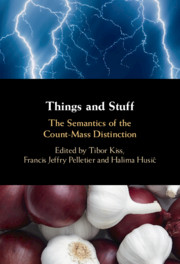Book contents
- Things and Stuff
- Things and Stuff
- Copyright page
- Dedication
- Contents
- Figures
- Tables
- Contributors and their Affiliations
- Preface
- 1 Editorial Introduction: Background to the Count–Mass Distinction
- Large-Scale Architectures for Count and Mass
- Implications from Individual Languages
- 6 Mass-to-Count Shifts in the Galilee Dialect of Palestinian Arabic
- 7 Object Mass Nouns as an Arbiter for the Count–Mass Category
- 8 Bare Nouns and the Count–Mass Distinction: A Pilot Study Across Languages
- 9 Counting (on) Bare Nouns: Revelations from American Sign Language
- Compositional Analyses and Theoretical Issues
- New Empirical Approaches to the Semantics of the Count–Mass Distinction
- References
- Language Index
- Subject Index
8 - Bare Nouns and the Count–Mass Distinction: A Pilot Study Across Languages
from Implications from Individual Languages
Published online by Cambridge University Press: 21 May 2021
- Things and Stuff
- Things and Stuff
- Copyright page
- Dedication
- Contents
- Figures
- Tables
- Contributors and their Affiliations
- Preface
- 1 Editorial Introduction: Background to the Count–Mass Distinction
- Large-Scale Architectures for Count and Mass
- Implications from Individual Languages
- 6 Mass-to-Count Shifts in the Galilee Dialect of Palestinian Arabic
- 7 Object Mass Nouns as an Arbiter for the Count–Mass Category
- 8 Bare Nouns and the Count–Mass Distinction: A Pilot Study Across Languages
- 9 Counting (on) Bare Nouns: Revelations from American Sign Language
- Compositional Analyses and Theoretical Issues
- New Empirical Approaches to the Semantics of the Count–Mass Distinction
- References
- Language Index
- Subject Index
Summary
This chapter presents the results of a pilot study where participants performed three tests with bare nouns in comparative constructions (affirmatives and interrogatives): (i) acceptability; (ii) picture matching; and (iii) quantity judgment. The independent variable is the noun phrase, with five levels: Bare Singular, Bare Plural, singular and plural Flexible Nouns, and Mass nouns. Four languages were investigated: English, Rioplatense Spanish, Brazilian Portuguese and Cape Verdean. The results show that the BS is the locus of variation; plural and mass nouns are stable across these languages. We argue that the Bare Singular in English and Rioplatense Spanish is an atomic predicate which is coerced to mass when in a cumulative context, such as comparison. In Brazilian Portuguese and in Cape Verdean, it is interpreted by cardinality, but for different reasons in the two languages. In CV, the Bare Singular is a variant of the Bare Plural, i.e. a number neutral noun. In Brazilian Portuguese its interpretation oscillates between cardinal and no-cardinal readings. We then argue it behaves as predicted by Pelletier (2012) – it is both mass and count.
- Type
- Chapter
- Information
- Things and StuffThe Semantics of the Count-Mass Distinction, pp. 193 - 212Publisher: Cambridge University PressPrint publication year: 2021



